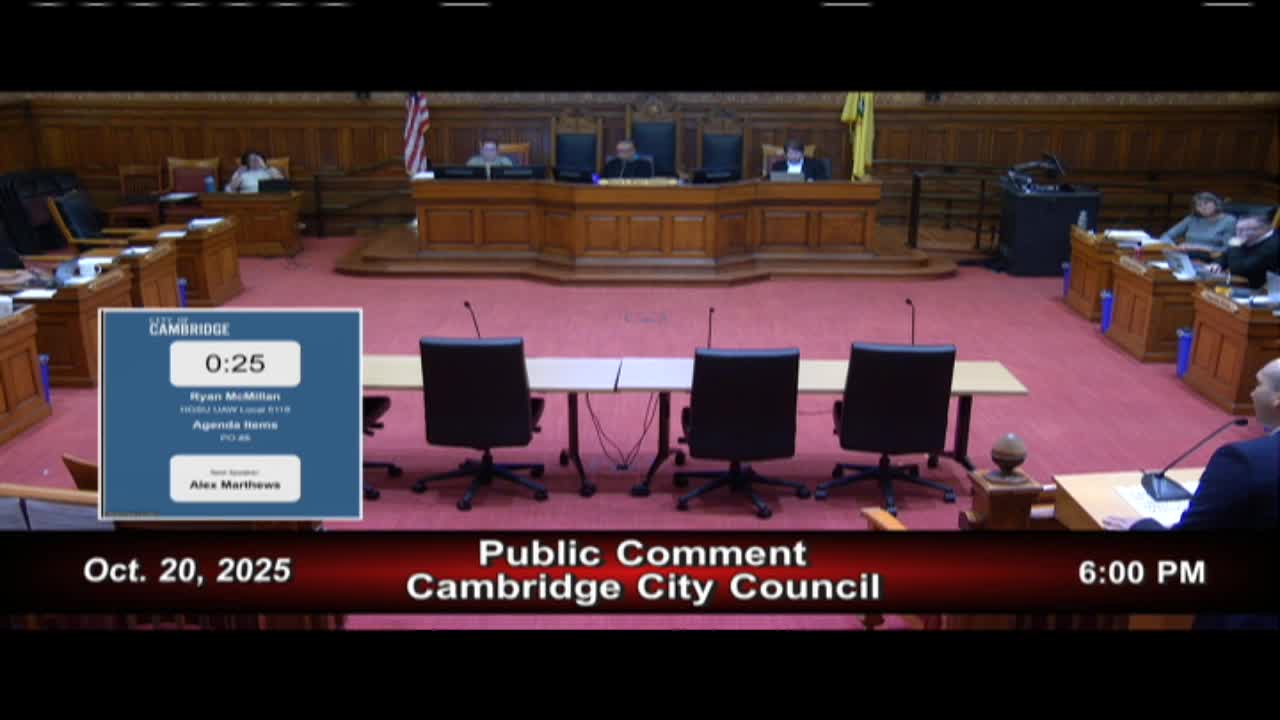Council pauses use of Flock Safety ALPRs and refers broader review to Public Safety Committee
Get AI-powered insights, summaries, and transcripts
Subscribe
Summary
After hours of public comment expressing privacy and civil‑liberties concerns, the City Council suspended use of Flock Safety cameras and referred a broader review of automated license‑plate readers to its Public Safety Committee; the council—s stop-order passed unanimously.
The Cambridge City Council voted to stop using Flock Safety license-plate‑reader cameras and all automated‑license‑plate‑reader (ALPR) technology currently in use until the City Council takes up and votes on the devices, and it referred a full review of ALPR deployment and contracts to the council—s Public Safety Committee.
The decision followed more than two hours of public comment and a lengthy council discussion in which civil liberties advocates, technologists and neighborhood residents urged the council to halt the project because of Flock—s nationwide data-sharing practices and because the company stores and shares ALPR data in a centralized database accessible to other agencies.
Speakers including Alex Matthews of Digital Fourth, Gideon Epstein of the ACLU of Massachusetts, professors and many Cambridge residents described national reporting and municipal audits that, they said, show Flock shared ALPR data with federal agencies and outside law-enforcement partners. They warned that nationwide queries of license-plate databases could be used to track people seeking reproductive or gender-affirming health care or to enable immigration enforcement.
Cambridge Police leadership and the city manager acknowledged the concerns and said the department had added policy restrictions intended to limit searches and to comply with the city—s welcoming‑city ordinance and state shield provisions. Police and city staff said they chose ALPRs to help solve violent crimes and cited an unsolved 2023 homicide as one of the reasons for pursuing ALPR technology. Commissioner Elou and Superintendent Wells said the department intended ALPRs to be an investigative tool and had built contractual and policy safeguards.
Councilors pressed for more transparency about the contract, external access to data and whether Flock employees or outside agencies might be able to query Cambridge cameras. Several councilors and community members asked for public, PII‑redacted audits showing external searches. Councilor Toner moved to send the matter to the Public Safety Committee for further study and for staff to convene stakeholders; the motion to refer passed on a 9‑0 roll call.
Separately, after debate about whether the ordinance and the contract gave the council sufficient oversight, the council suspended its rules to consider a late order proposed by Vice Mayor McGovern to stop all Flock and ALPR use pending the Public Safety Committee review. That order was amended and adopted on an affirmative vote of nine members; staff confirmed they would instruct the vendor to disable cameras and would verify that streams and queries are halted.
Ending: The council—s actions pause ALPR use in Cambridge and create a timeline for deeper review in the Public Safety Committee; staff were directed to provide the contract, audit logs or other documentation and to engage civil‑liberties groups as part of the committee process.
